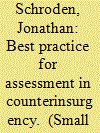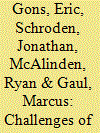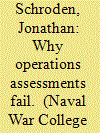|
|
|
Sort Order |
|
|
|
Items / Page
|
|
|
|
|
|
|
| Srl | Item |
| 1 |
ID:
131985


|
|
|
|
|
| Publication |
2014.
|
| Summary/Abstract |
In September 2011, the Commander of the International Security Assistance Force (ISAF) in Afghanistan directed the Afghan Assessment Group to redesign the way in which ISAF was assessing the status of the war, and to be 'revolutionary' in so doing. The resulting assessment paradigm was novel, non-doctrinal, and effectively addressed the unique complexities of the counterinsurgency in Afghanistan and the needs of the ISAF Commander. It had a two-tier structure consisting of both strategic and campaign assessments. The former focused on answering a set of strategic questions in narrative, analytic form to address the strategic environment, while the latter used a set of standards and accompanying narrative responses to gauge accomplishment of campaign tasks. Both tiers captured the current state of the war while maintaining an eye on future challenges and opportunities. The two assessments and their associated processes were designed to stimulate discussions leading directly to decisions by senior leaders on actions they could take, direct, or request. While any assessment paradigm will have advantages and disadvantages, an examination of the pros and cons of this assessment paradigm makes clear that it should be considered a 'best practice' in the field of counterinsurgency assessment.
|
|
|
|
|
|
|
|
|
|
|
|
|
|
|
|
| 2 |
ID:
113109


|
|
|
|
|
| Publication |
2012.
|
| Summary/Abstract |
Measuring nationwide progress of counterinsurgency operations in Afghanistan using violence trends is difficult due to several factors: aggregation of data to the national level may obfuscate disparate local trends; the observed seasonality in violence makes comparisons difficult and may obscure progress; and short-term spikes or troughs - attributable to weather, military operations and tempo, or holiday periods - heavily influence simple averaging schemes. Despite these challenges, proper understanding of violence statistics is critical to estimating the effectiveness of military forces added during a surge or redeployed as part of transition. This article explores methods for analyzing observed violence trends to identify causal factors, to provide a comparable baseline, and to inform assessments at appropriate levels of aggregation. One methodology for seasonal adjustment of violence data is discussed and shown to provide a logical baseline for examining trends. An ordinary least squares regression model is developed and implemented using time-series violence data.
|
|
|
|
|
|
|
|
|
|
|
|
|
|
|
|
| 3 |
ID:
115006


|
|
|
|
|
| Publication |
2011.
|
| Summary/Abstract |
In any military campaign, commanders, politicians, and the general public all desire to know whether the effort is succeeding. For conventional conflicts, well
developed theories of war give a good understanding of the objectives to pursue
and how to pursue them. These theories also enable the derivation of well defined metrics for progress, such as terrain held, numbers of enemy fighters killed
or captured, or amount of enemy equipment and materiel destroyed. In unconventional conflicts the theories of war are more complex, objectives and ways to
achieve them are less straightforward, and notions of "winning" and "losing" are
more difficult to define. As a result, it is also more difficult to gauge and demonstrate progress in such conflicts. For the specific case of counterinsurgency, however, gauging and demonstrating progress is at least as important as in a conventional war, since the former tends to last longer and therefore requires sustained
political and public support to conduct-and such support is often tied to proof
of progress. Thus operations assessment, designed to show whether progress is
being made, should be a vital part of any unconventional conflict, especially
counterinsurgency.
|
|
|
|
|
|
|
|
|
|
|
|
|
|
|
|
|
|
|
|
|